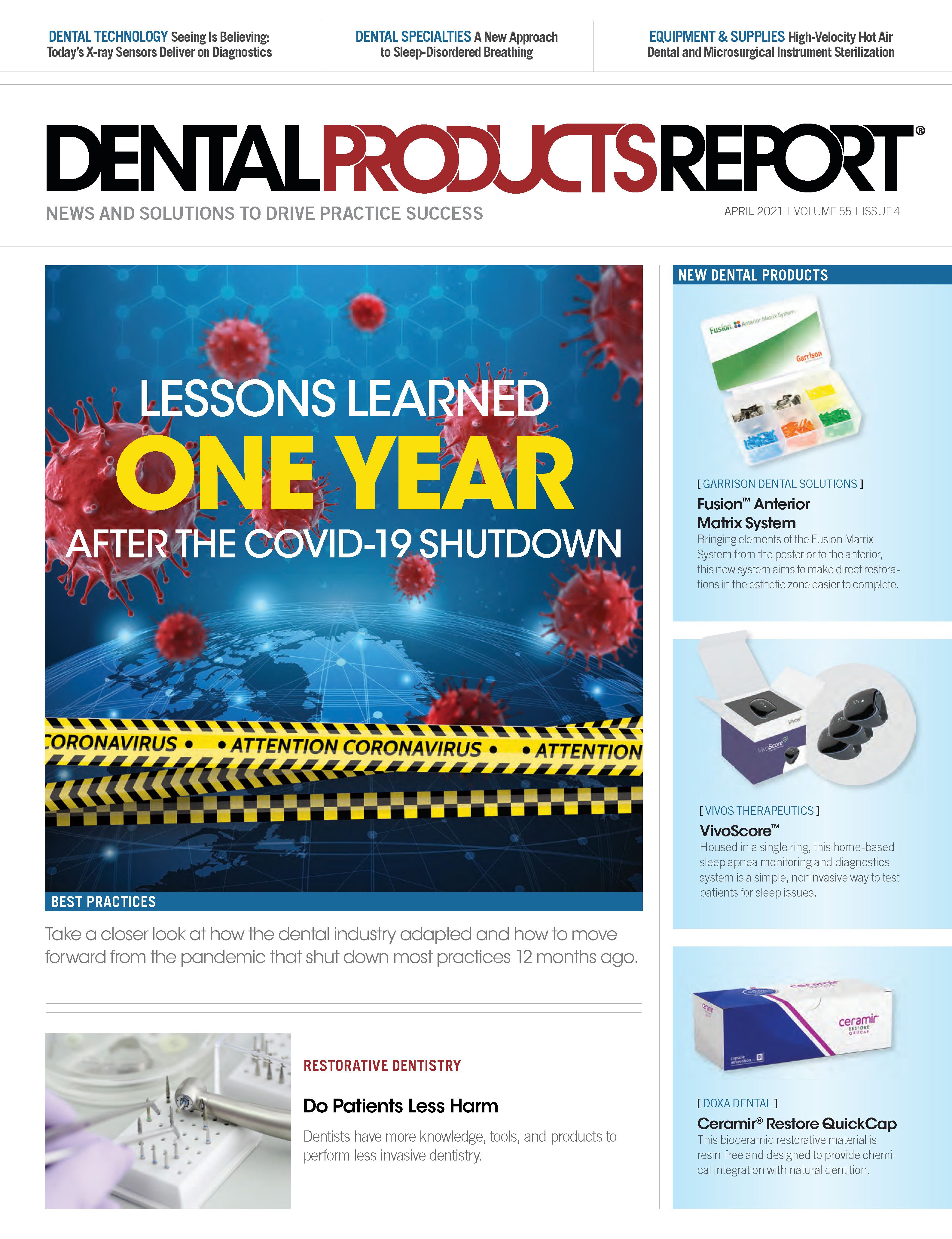A Shot In the Arm: Things Dentists Need to Know Now that Vaccines Are in Play
Infection prevention considerations with the COVID vaccine rollout.
MYBOYS.ME / ADOBE.STOCK.COM

Throughout 2020, nothing was more eagerly awaited than the COVID-19 vaccine. The vaccine, it was thought, would be the steppingstone to ending the pandemic and society returning to normal. But now that it is finally here, what does the vaccine’s rollout mean for dental practice infection prevention?
The Advisory Committee on Immunization Practices (ACIP) provides advice and guidance to the Director of the CDC regarding use of vaccines and related agents for control of vaccine-preventable diseases in the civilian population of the United States, recommending the COVID-19 vaccine to healthcare workers in its first rollout phase.
“They warn about the flu virus, measles, mumps, rubella—they have recommendations for them,” Douglas Risk, DDS, says. Dr Risk is the Compliance Manager and private practitioner at Tidewater Dental in Southern Maryland, serves on the Executive Board of Directors for OSAP, is a Diplomate of the American Board of General Dentistry, and is a Fellow of the International College of Dentists. “The ACIP has the best interest of the providers and the patients in mind. If they are saying that healthcare providers should get the vaccine, then yeah. Healthcare providers should get the vaccine.”
A Certain Level of Protection
Healthcare professionals have a particular need for the COVID-19 vaccination, especially dental healthcare personnel (DHCP).
“The microbiologist side of me, and everything that I have read on the research and the data that I have seen, tells us that we have to get the vaccination to get ahead of infections, especially these emerging variants,” infection prevention consultant and speaker Jackie Dorst, RDH, BS, says. “It's almost as if we're in a race to get the population vaccinated, and get to that goal of 70 to 80 percent to provide us with herd protection so that we can get ahead of this virus and reopen our society and get back to being able to hug each other.
“Dental healthcare professionals are right there on the forefront of exposure with all of the aerosols that we create,” she continues. “The patient has to be unmasked for us to treat them. You can't treat a patient in the oral cavity without them being unmasked. Unlike going to the dermatologist or going to the general physician, where patients can still wear their mask the entire appointment. Dental patients can't. The patient has to take off their mask for us to care for them. It’s so very important that we get vaccinated. The other important thing is that after you are vaccinated, and you've had both doses of the vaccine, that you continue to wear your PPE, because at this time we don't have enough data on how quickly our immune systems provide that total protection.”
Dr Risk warns, however, that the vaccine is not a magic bullet—proper infection control protocols must still be adhered to.
“It’s not an, ‘I'm going to get the vaccine. Therefore I never have to wash my hands again,’ kind of thing,” Dr Risk says. “It's not reasonable to expect that everything is going to change just because a few people, or the person that is doing the work, gets vaccinated. The entire population that we see also has an ability to carry virus still, whether they're vaccinated or not.”
The National Institute for Occupational Safety and Health (NIOSH) Hierarchy of Controls should still be followed to mitigate infection risks.
“We've got this bigger subject of source control, the source of the virus,” Dr Risk observes. “You want to control that. We've got the engineering controls. We've got the administrative controls. We've got the ability to screen. Maybe the tests are going to come out, which are going to be able to catch infectivity. It’s not just, ‘Are you sick?’ but, ‘Are you contagious?’ Those are the things that are really going to be a game-changer, along the vaccine, because the vaccine is going to afford us some protection against getting very sick. It’s probably not going to afford us that much protection if we are definitely exposed to not being just ‘a little bit sick’. So vaccine has a perspective.”
Who Shouldn’t Get It
As important as it is to get the vaccine, there may be some team memberswho shouldn’t or can’t get it. Of course, that will depend on the individual and their unique health circumstances.
“Obviously, if you're allergic to any components of the vaccine or you have the constitution as part of your makeup that hasn't been tested, folks trying to get pregnant, or perhaps some of the other contraindications,” Dr Risk says. “There are some people that we don't have the data to support the safety. Those people should be very cautious and very aware of the risks and benefits of the vaccine, whether it should be administered or not.”
“CDC is giving really good, sound advice, and there are individuals that have unique health circumstances such as being in the middle of cancer treatment, have a chronic illness, or have some other extenuating health issues that they need to check with their individual physician,” Dorst adds. “And the other concern at this time is about pregnant women. Should they get the vaccine at this time? And CDC is, again, referring any woman who are pregnant to their obstetrician or gynecologist for individual counseling. The message from CDC is that, at this time, there's a greater risk of a pregnant woman acquiring a COVID infection during her pregnancy and causing complications for the mother. The cases that have been studied by the CDC of women who did acquire a COVID infection during the pandemic have not indicated that there are any effects on the baby, on the developing fetus.”
According to CDC, “Based on current knowledge, experts believe that mRNA vaccines are unlikely to pose a risk to the pregnant person or the fetus, because mRNA vaccines are not live vaccines. The mRNA in the vaccine is degraded quickly by normal cellular processes and does not enter the nucleus of the cell. However, the potential risks of mRNA vaccines to the pregnant person and the fetus are unknown because these vaccines have not been studied in pregnant people.”
Best Practices
Even though DHCP have priority for the vaccine, in the event they have not yet been vaccinated, there are protective steps that should be followed.
“If you cannot get the vaccine, if it's not available in your community at this time, then stay strong, stay the course, maintain wearing your PPE, screen all patients as they come in, take their temperature, ask about symptoms, and have them wear a mask and sanitize their hands” Dorst advises. “A pre-procedural mouth rinse before you even begin treatment will reduce the microbial flora in their mouth. There's limited research on which chemical mouthwash is effective against the virus, but an antimicrobial mouth rinse will give you a safer field with fewer microorganisms in the oral cavity.”
She reminds dental healthcare professionals of the importance of adhering to NIOSH’s Hierarchy of Controls.
“I think we've gotten a little lax,” she says.“One of the things that I've noticed with my clients and other dental offices is that there's the temptation to schedule more patients and have patients sitting in the waiting room. As we reopened our offices after closure, patients waited in their cars, no one waited in the reception room for appointments. We sent patients a text message or called them and said, ‘Okay, it's time to come in now.’ I'm seeing a few offices that have 5 or 6 people in the reception room, and the chairs are not always 6 feet apart. So, I would caution offices to continue to stay strong and maintain their vigilance with Universal Source Control precautions. And of course, ask all patients to wear a mask at all times when they're in the office, except when they're receiving direct care.”
Whether staff is vaccinated or not, whether the pandemic has ended or not, Dr Risk advises practices to continue following current patient screening procedures.
“The important thing is, moving forward, we still need to be able to understand the science behind infection control,” Dr Risk says. “We still need to be doing risk assessments on every patient. I think from now on, and realistically we should have been doing this as soon as we came up with a collection of risk factors back in 2003, people with certain travel histories should be suspect, or they should be considered at-risk of having viruses or disease processes going on, or incubating that. We saw it with the first SARS. We saw it with MERS, we saw it with H1N1 in 2009. Hopefully, we've gotten into the habit now, and we've all got thermometers, and we've all got our pulse oximeters—not everybody, but a good portion of practices have them. Pre-screening is going to be a huge factor in our future and should stay that way, along with the risk assessment and the proper infection control procedures that are possible to mitigate risks—the engineering controls, the substitution, the elimination, and so forth. When we do see a patient that has a cold or has a flu, or, ‘I’m not really feeling well today,’ we should be ready to provide that patient care without an exposure or possibly without an aerosol-generating procedure, so that everyone stays safe. And, I hope that continues, because we know that aerosol-generating procedures in dentistry provide a lot of our infectious potential.”
